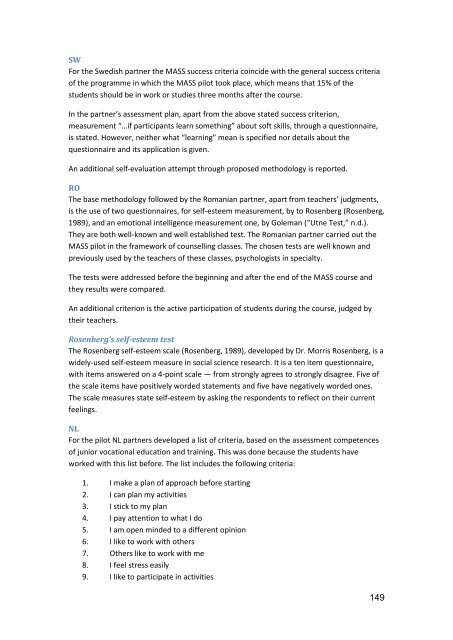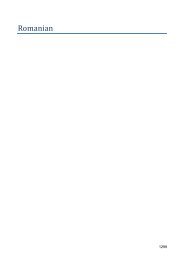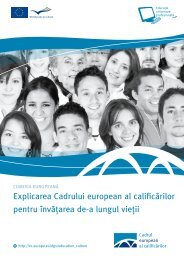Teaching and Assessing Soft Skills - MASS - Measuring and ...
Teaching and Assessing Soft Skills - MASS - Measuring and ...
Teaching and Assessing Soft Skills - MASS - Measuring and ...
You also want an ePaper? Increase the reach of your titles
YUMPU automatically turns print PDFs into web optimized ePapers that Google loves.
SW<br />
For the Swedish partner the <strong>MASS</strong> success criteria coincide with the general success criteria<br />
of the programme in which the <strong>MASS</strong> pilot took place, which means that 15% of the<br />
students should be in work or studies three months after the course.<br />
In the partner’s assessment plan, apart from the above stated success criterion,<br />
measurement “…if participants learn something” about soft skills, through a questionnaire,<br />
is stated. However, neither what “learning” mean is specified nor details about the<br />
questionnaire <strong>and</strong> its application is given.<br />
An additional self-evaluation attempt through proposed methodology is reported.<br />
RO<br />
The base methodology followed by the Romanian partner, apart from teachers’ judgments,<br />
is the use of two questionnaires, for self-esteem measurement, by to Rosenberg (Rosenberg,<br />
1989), <strong>and</strong> an emotional intelligence measurement one, by Goleman (“Utne Test,” n.d.).<br />
They are both well-known <strong>and</strong> well established test. The Romanian partner carried out the<br />
<strong>MASS</strong> pilot in the framework of counselling classes. The chosen tests are well known <strong>and</strong><br />
previously used by the teachers of these classes, psychologists in specialty.<br />
The tests were addressed before the beginning <strong>and</strong> after the end of the <strong>MASS</strong> course <strong>and</strong><br />
they results were compared.<br />
An additional criterion is the active participation of students during the course, judged by<br />
their teachers.<br />
Rosenberg’s self-esteem test<br />
The Rosenberg self-esteem scale (Rosenberg, 1989), developed by Dr. Morris Rosenberg, is a<br />
widely-used self-esteem measure in social science research. It is a ten item questionnaire,<br />
with items answered on a 4-point scale — from strongly agrees to strongly disagree. Five of<br />
the scale items have positively worded statements <strong>and</strong> five have negatively worded ones.<br />
The scale measures state self-esteem by asking the respondents to reflect on their current<br />
feelings.<br />
NL<br />
For the pilot NL partners developed a list of criteria, based on the assessment competences<br />
of junior vocational education <strong>and</strong> training. This was done because the students have<br />
worked with this list before. The list includes the following criteria:<br />
1. I make a plan of approach before starting<br />
2. I can plan my activities<br />
3. I stick to my plan<br />
4. I pay attention to what I do<br />
5. I am open minded to a different opinion<br />
6. I like to work with others<br />
7. Others like to work with me<br />
8. I feel stress easily<br />
9. I like to participate in activities<br />
149





